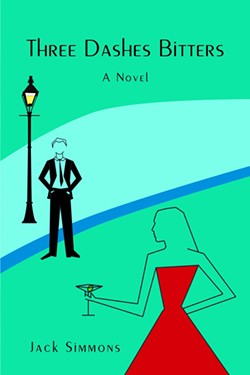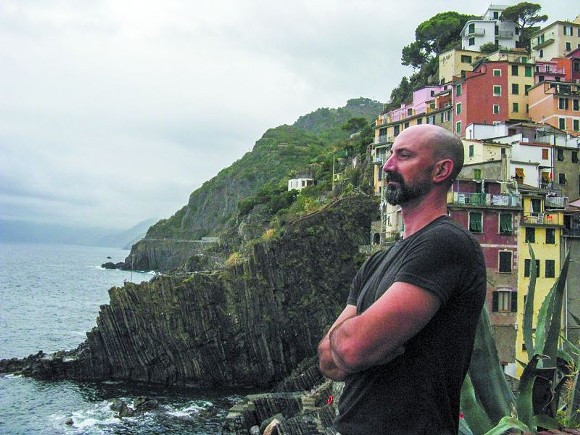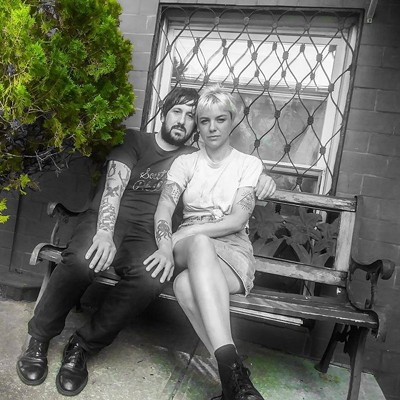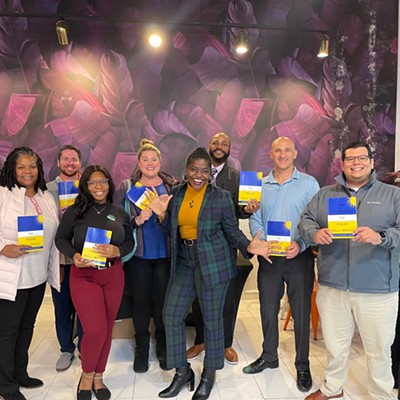JACK SIMMONS is a popular professor of philosophy at Armstrong State University. Now he’s added another line to his resume: Novelist.
Three Dashes Bitters is a light-hearted comedy that takes place over the span of a few crazy days and nights during a debutante ball in New Orleans.
In the vein of the classic picaresque novel, budding philosopher Tim Schmidt navigates a series of off-kilter vignettes involving wacky, mostly inebriated perpetual grad students, hot weather, and hot women — one of whom he may or may not be truly in love with.
The alcohol-fueled story is divided into chapters named after cocktails; each chapter features its own recipe you can enjoy yourself.
Simmons will sign books and read an excerpt or two this Friday at the Sentient Bean. We spoke to him this past weekend.
You achieved something difficult: You wrote a book set in New Orleans that is free of the familiar tropes in almost every other book set in New Orleans.
I didn’t actually set out to write about New Orleans. I wanted to write what I know. And I went to grad school in New Orleans. So that’s something I know.
I definitely didn’t want to indulge in the usual clichés like funny accents, or talking about “The Big Easy,” and stuff like that. I mostly wanted to capture the notion of Southern decline.
There’s certainly a lot negative to say about a place that never seems to change. But on the other hand the fact that New Orleans never changes is a bit comforting.
It’s comforting that there are still places that resist mass consumerism. Not that New Orleans necessarily always resists consumerism! But my New Orleans does, in my book (laughs).
Also, I wrote most of this before Katrina even happened, so it doesn’t deal with any of those issues. Originally it took place during the second Bush recession. I was actually in grad school during the first Bush recession. So I originally had a running joke in the book that anytime a Bush is in office, we get a recession.
Through the voices of several characters, you often satirize your own profession as a philosophy professor.
Absolutely. That was part of the goal. You notice whenever someone starts to wax philosophic about something, they ask themselves if it’s because they’re drunk.
I didn’t want to preach to people. It’s not a mean-spirited critique of the profession. I always find that a bit underhanded, when writers do that. A lot of the comedy comes at the expense of universities and grad students, but they’re not blamed for the world’s evils or anything like that.
I wanted the characters to bring up ideas, and maybe even if they bring them up in the wrong way or if it’s total bullshit, it at least gets someone to think about it.
I also wanted to get at the notion of these middle class white guys with no real power. They keep hearing that the world is made just for them, but none of them feels like the world is their oyster.
I want to capture the despair of mediocrity. It’s certainly not suicidal despair, but just like, meh.
In the end though, this seems to be a novel about the mystery of women, and how men are always trying to figure it out. And like most stories on that topic, the men in your book never do.
I’ll buy that. To me though, it’s more about friendship among men, and how that factors into their relationships with women in addition to other things.
It’s kind of a bromance, really. The closest bonds in the book are between men.
They’re all trying to figure out women, life, professional issues. Tim, the main character, is trying to navigate the notion of life, and love, and his passions.
In this world we’re always asked to be passionate about our jobs. Sometimes we’re making maybe eight bucks an hour, but there’s still an expectation that we will somehow find our life’s great passion in a job like that.
So really, the only place most of have a true opportunity to express real passion is in relationships. The way we used to negotiate these things is through the intimacy of friendship. But now we’re mostly expected to navigate these issues through various types of media.
And of course your friends don’t really know what they’re doing either! But they’re your friends, so hopefully you learn together.

































